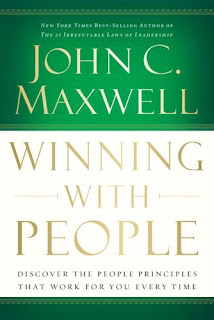Winning with others is about understanding both ourselves
and other people we live and work with. Before one can truly grasp the needs
and desires of another person we must first understand our own needs and
desires. It is through this self-reflection that we gain the ability to see
other people for who they truly are. We cannot accurately see others until we
understand what biases we hold about ourselves that impact our perceptions
The book Winning with
People by John Maxwell sheds light on human relationships and how we come
to understand and live with each other. On any particular day we associate,
negotiate with, and deal with many other people who have their own interests in
mind. Some of them are well developed and others are suffering from their own self-perception.
Before we can understand our place in these social networks
we must first understand that the entire population of the world, with the
exception of ourselves, is composed of other people. It means that we are only
one small piece of a larger pie. It is beneficial to take the perspective of
the “other” before trying to force them to the submission of our will. Our way
of thinking may not be the only way of thinking....or even the best way.
Conflicts within the workplace are common. They are bound to
happen by the sheer fact that we are negotiating for wealth, influence and other
resources. However, by caring for other people we have created stronger trusting
relationships that supersede the conflict. It isn’t as though conflict is not
necessary but that such conflict is done with conscious awareness of the
perspective of the other person, their development, and the greater positive
outcome.
When we celebrate and engage with people we find them
willing to celebrate and engage with us. There are those in life and at work
that have a hard time connecting with anyone. This is due to their perceptual
problem with themselves and not necessarily with the group. At other times, it may be the group and not the individual. Seek to look at and
develop others and they will seek your development. We all go up or down together
through shared experience.
Of the wisdom that this book offers is a saying of Johann
Wolfgang von Goethe:
Treat a man as he appears to be and you make him worse. But
treat a man as if he already were what he potentially could be, and you make
him what he should be.
The quote is perfect for managers who desire to create
higher levels of performance with workers. If a manager treats employees as
though they are lazy, uncooperative, and self-interested they will become so.
However, if you were to treat a worker s as though they have specific job
knowledge, were contributors to organization, and capable of improved
performance the worker will do so.
The book is written at an undergraduate level and the author has put forward a number of important works on social relationships. Even though the
book doesn’t state self-fulfilling prophecy it does elude to such a concept. It
contains a strong message for students of business in the sense that we create
what we see. What we see is based upon our perception of self. This
self-perception creates our understanding of the world in which we live.
Maxwell, C. (2005). Winning
with People. Nashville, TN: Thomas Nelson.
ISBN: 978-0-7852-8874-9
Pages: 270
Cost: $12.00
Blog Ranking: 4.1/5
